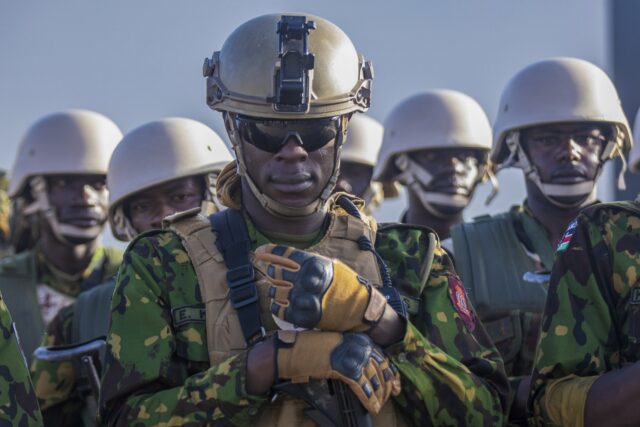Anticipation is mingling with fear across Haiti as the country welcomes the fourth major foreign intervention in its history to fight gang violence
Haitians hold their breath as newly arrived Kenyan police force prepares to face gangsBy DÁNICA COTO and EVENS SANONAssociated PressThe Associated PressPORT-AU-PRINCE, Haiti
PORT-AU-PRINCE, Haiti (AP) — Anticipation is mingling with fear across Haiti as the country welcomes the fourth major foreign intervention in its history to fight gang violence choking the Caribbean country.
A couple hundred police officers from Kenya met early Wednesday with Prime Minister Garry Conille as they prepare to deploy in upcoming days. No one except high-ranking officials knows their assignment, which officials have said is for security reasons.
Expectations are high: Haitians are scared and tired of gangs that have pillaged their way through the capital of Port-au-Prince and surrounding areas, killing, raping and kidnapping thousands of people in recent years and leaving hundreds of thousands of others homeless and unemployed, which in turn has deepened poverty.
“I’m asking the prime minister and the Kenyans to free Haiti from these gangs,” said Mathurin Jean François, a 30-year-old math teacher who has been unemployed for two years because gang violence forced his school to close. “Many people are suffering.”
The first U.N.-backed contingent of foreign police arrived Monday. They will later be joined by police and soldiers from the Bahamas, Bangladesh, Barbados, Benin, Chad and Jamaica for a total of 2,500 personnel.
“The Haitian strategy is to restore security house by house, neighborhood by neighborhood, town by town,” Conille said Wednesday as he met with Kenyan police.
Whether that will happen remains to be seen. Gangs control 80% of Port-au-Prince, and they are better equipped than Haiti’s National Police, brandishing assault rifles and showing off ammunition on social media that includes .50 caliber bullets.
On Feb. 29, gangs launched coordinated attacks that eventually led Prime Minister Ariel Henry to resign. They raided more than two dozen police stations, opened fire on the main international airport, forcing it to remain closed for nearly three months, and stormed Haiti’s two biggest prisons, releasing more than 4,000 inmates.
The Kenyan-led mission in Haiti will have to prove it’s effective, said Sabrina Karim, an assistant professor of government at New York’s Cornell University who focuses on conflict and peace processes.
“It’s a very tricky mandate that requires experience and strong local knowledge,” she said, noting that the Kenyans must gain the trust of Haitians already distrustful of a government long linked to corruption and gangs. “The accountability piece is really important. That ultimately decides whether the Haiti public is going to accept the mission or not.”
Previous interventions have gone awry. The U.N.’s 2004-2017 peacekeeping mission was marred by allegations of sexual assault and the introduction of cholera, which killed nearly 10,000 people.
“The track record isn’t great for the Kenyan police either,” Karim said in a phone interview. “All eyes are on the Kenyan police to demonstrate that they can do better.”
Kenyan police have faced allegations of abuse for years, including extrajudicial killings. Most recently, they were accused of opening fire on protesters that stormed the parliament in the Kenyan capital on Tuesday.
Nonprofit organizations who work in Haiti have said they’re concerned about the Kenyan-led mission, especially since the U.N. recently announced that between 30% to 50% of members of armed groups are now children.
“The risk of child casualties is significant,” the U.S.-based nonprofit Save the Children said in a statement. “An increasing number of children in Haiti have been driven to join armed groups due to hunger and desperation. These children are victims of child rights violations, and must be treated as children, not as militias.”
It noted that aid agencies have received “alarming reports” of armed groups using children and teenagers in confrontations with Haiti’s police.
For now, Haitians are closely watching the Kenyans with mixed feelings.
“There’s a breeze of hope in the air,” said Frantz Pradieu, a 39-year-old carpenter who was making a table, his first job in many months.
“If the Kenyans work hard, maybe in a few months from now, the economy will turn around,” he said as sweat rolled down his face and bare chest while he worked. “A lot of people want to work. A lot of people lost their jobs. This has been a catastrophic situation for the last three years. Everybody is living in fear. People are being kidnapped. People are being raped. This needs to stop.”
___
Coto reported from San Juan, Puerto Rico. Associated Press videographer Pierre Richard Luxama in Port-au-Prince, Haiti, contributed.

COMMENTS
Please let us know if you're having issues with commenting.